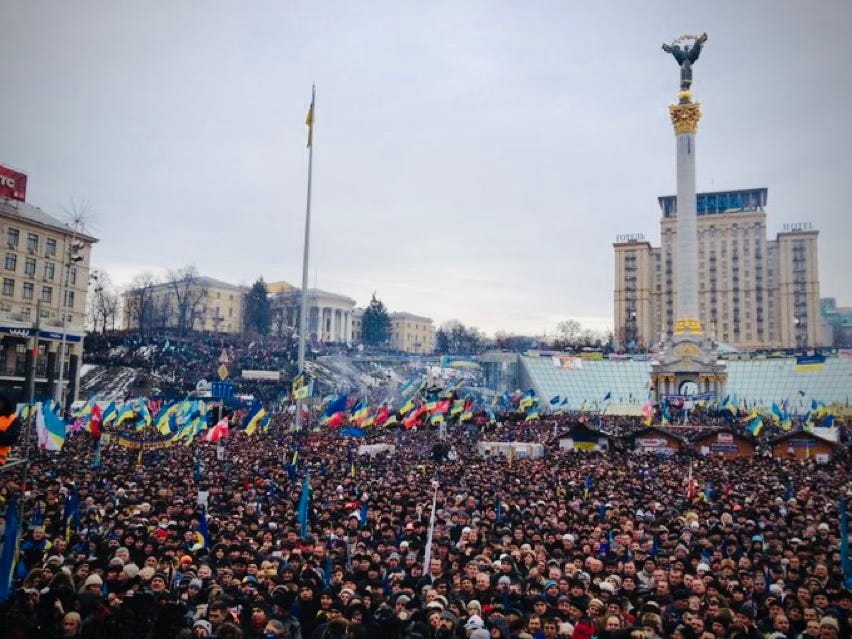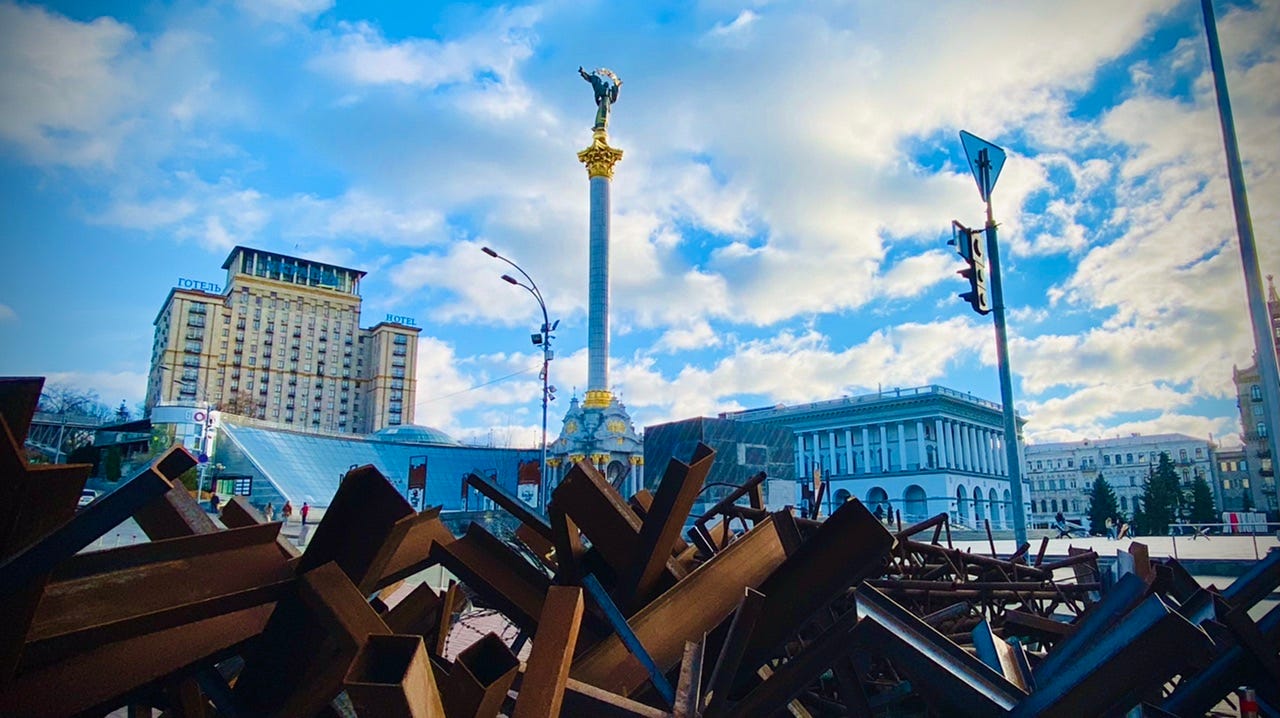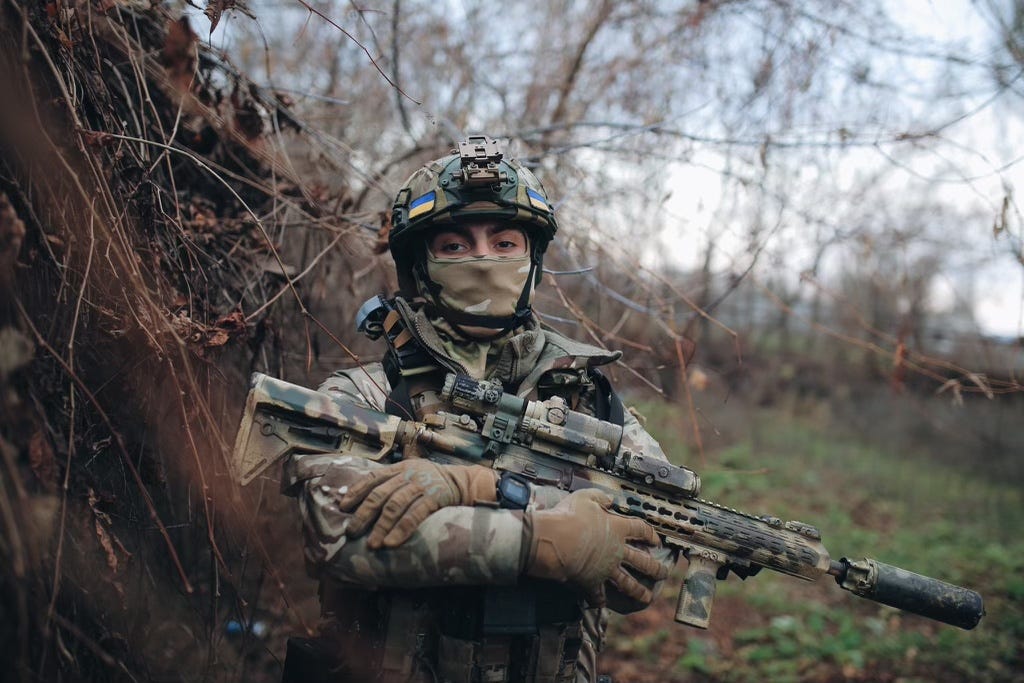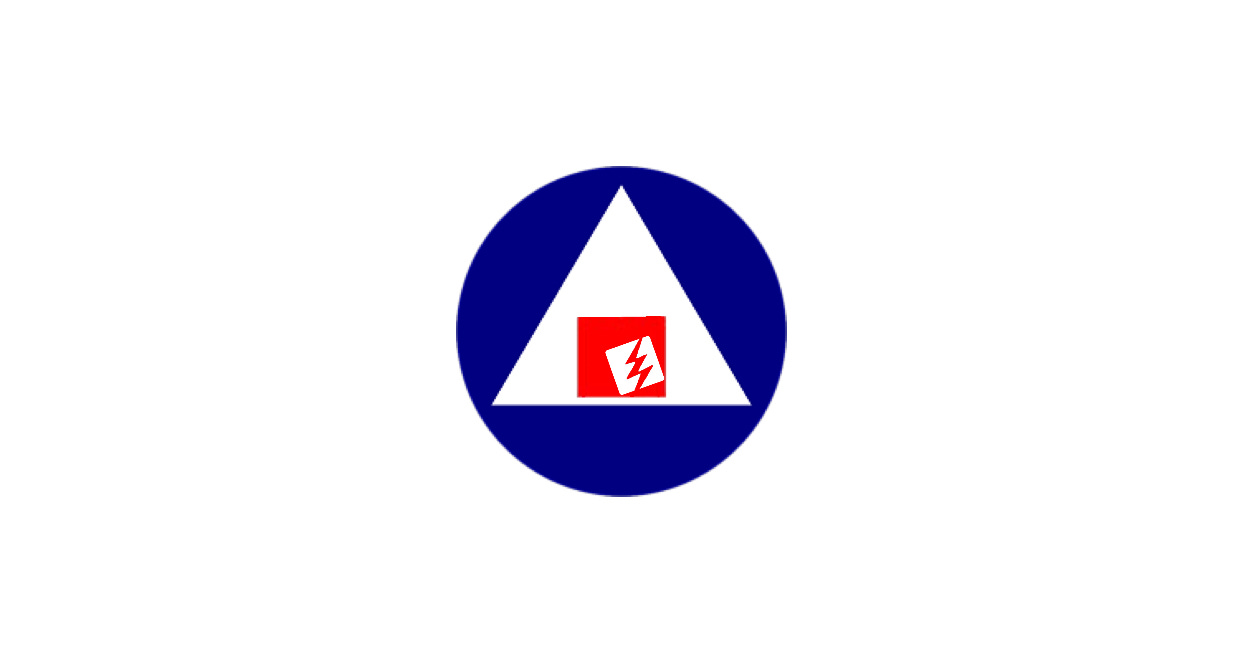Freedom, dignity, survival: We owe it to Ukraine to make the blood price they pay for victory less
Marking nine years since Ukraine’s Revolution of Dignity & Georgia’s hybrid defeat — and why the West must understand both to see the way ahead
It was Thanksgiving week 2013 — exactly this week, nine years ago. The deep blue sky was glorious over Washington DC. The Capitol Dome was shining. The golden autumn sun held back the chill in the crisp November air. The doors hidden under the grand stairs that ascend from the plaza on the east side of the Capitol to the formal entrance of the House of Representatives swung open, and Misha Saakashvili — who had just finished his second term as President of Georgia at the age of 45 — strode out into the group of congressmen who concealed their smoking habit in the shaded arch under the stairs.
Puffs of smoke were drawn in sharply by the startled congressmen, eyes going wide — and in their defense, we were not, strictly speaking, supposed to have come out of this door. But there was Misha, towering over them in casual post-presidency wear, looking past them to the bright sun beyond. The smokers included two members of the House Foreign Affairs Committee who knew Misha well; both were hiding their cigarettes behind their backs like guilty schoolboys. They blinked as Misha dawned his sunglasses and gave them a jaunty wave — “Oh hey,” he said, finally realizing they were there — before zipping off into the plaza. There was an audible sound of exhaling.
“Congressmen,” I nodded in greeting and farewell before they could absorb my presence (or the laughter I was hiding), half-running as always to catch up with Misha, who mostly moved through life at one speed: cannonball.
Misha was in town for two reasons. First, to distribute the medals he had awarded to the members of Congress who had aided the fight for Georgian freedom and democracy in the transformational (cannonball speed) years since Georgia’s Rose Revolution in 2003. Second, to warn them about what was coming now.
Misha had come to Washington directly from Ukraine, where just days before the demonstrations that would become the Euromaidan protests had kicked off.
“Support them,” Misha told every member of Congress that we met — plus a few more that he ambushed coming off the House floor from votes. “Support their aspirations and what they want. They have chosen you, and you have to understand how important it is for you to be with them.”
He went into more detail about this at a long table of haphazardly assembled staffers eating plates from the basement cafeteria’s famous Thanksgiving buffet lunch. A holiday about survival, and we talked about survival. They were all friends of Georgia, and they wanted to know what would happen there now after the complete transfer of power to the Georgian Dream party, led by a Russian-made billionaire. But Misha would just shake this off. It was the end of something in Georgia — though few in Washington were willing then to acknowledge the decade of drift, decline, and Russian hybrid success that was to come — but it was the beginning of something critically important in Ukraine. Misha knew this instinctively, seeing them as points along the same Russian spectrum of activity. Georgia, for now, was lost. But Ukraine could still be won. Ukraine, he said, must be won.
In the weeks and months that followed, Misha would spend much of his time in Ukraine, and on the Maidan, among the demonstrators or rallying them from the stage. Many of the Congressmen and Senators we saw that day would join him in Kyiv to support the brave Ukrainians on the burning, frozen square. All of this drove the Russians absolutely crazy, with state media going into hyperdrive about “the CIA-backed coup” and secret plots to blah blah. But the truth then was the same as the truth now: this was an entirely Ukrainian effort to fight for Ukraine’s future in the way that it had to be won.
Ukraine could change the future for everyone. Only now, nine years later, do I think the full scope of what Misha meant is truly visible.
* * * * *

November 21 is the Day of Dignity and Freedom in Ukraine. It marks the anniversary of the official beginning of the demonstrations in 2013 — known in the West as the Euromaidan protests, but known to Ukrainians as the Revolution of Dignity. It also marks the day in 2004 when the protests that became the Orange Revolution began. First the fight for freedom, and then the fight to keep it. Freedom, and dignity.
The Orange Revolution — coming a year after Georgia’s Rose Revolution, of which Misha was one leader — was a youthful, optimistic wish for a better, more pro-Western Ukraine that could enjoy the economic and security benefits of faster European integration. The Orange Revolution’s success briefly brought new momentum to Ukrainian aspirations, but (for reasons of Russian hybrid measures, political infighting, and corruption that I will not go into here), too soon Russian-aligned actors returned to power. The public figurehead was Viktor Yanukovych and his “party of regions” — aided, of course, by Paul Manafort and his team, and by the Russian intelligence agent who nominally worked for Manafort in Ukraine.
Things drifted along for a while — the same feigned movements towards the West that we have seen in Georgia since 2013, nice words but no action — but when Yanukovych moved to preclude Ukraine’s further European integration, Ukrainians came back to the streets in massive numbers, and stayed on the Maidan through ice, fire, and sniper fire to defend with will and blood the future they know Ukraine deserves. The Maidan was a forge — a more mature iteration of the Orange Revolution, and more realistic about what was required to be free of Russia, about the work that needed to be done, and about what it would take to be truly in control of the nation’s destiny. The Maidan was purposefully designed as a mass movement, not as the rise of new charismatic personalities to take control. This momentum is evident in how Ukraine fights the Russian invasion.
Many of the Ukrainian defenders now on the frontlines don’t remember any of the Soviet days. They were barely born during the Orange Revolution, and still relatively young during Maidan. In the years after, living in a vibrant Ukraine, the war in the east pretty far away for most people, they may have believed these kinds of tests were over. But now they are in the trenches, on the tanks, and flying drones. They sit right next to the far more grizzled veterans who flocked to Ukraine’s new army after the Russian invasion in 2014. In 2019, the average age of Ukrainian recruits was 36, and the average age of defenders at the front was closer to 40 — all evidence that the generation who remembered what it was like not to have independence felt a personal duty to fight for it when it was under threat.
Now, during the total invasion, every generation of Ukraine understands this war in a visceral, instinctive way. Cultural memories of Holodomor, when millions of Ukrainians were starved to death by Stalin to get them to submit to Soviet will, and other Stalinist oppressions have been refreshed by the Russian barbarism evident in Ukraine’s occupied regions as they are steadily recovered by Ukrainian forces. Torture, executions, disappearances, efforts to erase and destroy Ukrainian culture, efforts to destroy all aspects of economic life. Families disassembled. The 2022 war is for survival — but it is a war about far more than survival, too. It has galvanized Ukrainians into a fundamentally new nation. There is no way back.
It was nine years between the Orange Revolution and the beginning of the Maidan — and now another nine years to the depths of war.
One revolution for freedom, one for dignity — and now a war for survival.
A war that Ukrainians hope will be the final blood price they must pay for the future they have waited for for so long.
A war that Ukrainians hope will decide whether we can together shake off history or merely remain captives of it.
* * * * *

For the Kremlin, the Rose Revolution and the Orange Revolution are forever linked, forming the foundation of the persistent paranoia about “color revolutions” taking things away from Russia that set the strategy for the new era of Russian aggression that began officially in 2007. For Moscow, Georgians and Ukrainians — especially those who had been educated in the West after the Soviet collapse, or who had spent time on US exchange programs, for example — wanting to decouple their national futures from Moscow’s efforts at control was a sure sign of a plot against the Kremlin. It could not be that these nations wanted to be free of the imperial meddling that had subjected them to seven decades of ruthless oppression, apparently. It could not be that the far more rapid European integration of the Baltic states served as an example to others. No, no — surely, a plot against Russia.
The Kremlin’s attempts to dismantle these revolutions came in many forms, and different tactics were used in both places at different times, but the linkage remains. The Russian invasion of Georgia in 2008 served to stall both nation’s NATO aspirations, which then-President Medvedev admitted was its purpose. Failing to respond adequately to Russian aggression in 2008 set the pathway for enhanced hybrid measures in both nations, for the return of Yanukovych, for the election of the oligarch in Georgia, and ultimately for the Russian invasion of Ukraine in 2014. These eight years of war against Ukraine have allowed the Kremlin to advance its work in Georgia without much attention or interference. Many of the driven, talented Georgians that worked in the government under President Saakashvili ended up in Ukraine when they were forced to leave Georgia — building the new police force, reforming the prosecutor’s office, serving in countless ways — as did many Georgian officers and soldiers, including a former chief of defense, who came to fight Russians in Ukraine when the new Georgian government showed little interest in doing the same.
Georgia is Russia’s most successful hybrid war. As it is now, it is nearly won. Only a total Ukrainian victory may help to change that dynamic. Because the problem has not only been unfettered re-infiltration of Russian money and assets back into the system in Georgia, but the complicity of Georgia’s western partners in feigning blindness of this advance for far, far too long — as it did to some extent in Ukraine before the Maidan. To date, President Zelensky has been one of the few willing to call the Georgian Dream movement what it really is — another puppet of Russian influence.
* * * * *
These nine years have been critical for Ukraine — and for Georgia. As Ukraine won its independence — again — and moved most crucially toward building institutions that would defend the nation, Georgia slid back down the sand dune, not really bothering to take many steps upward while this oligarchic noose of Russian influence was pulling them steadily downward.
But I think of the Georgians in Ukraine, quietly helping where they can, and doing everything now because they cannot bear to lose another country. There are other Georgians scattered across international institutions and organizations, universities and think tanks, working in myriad ways to slow and reverse the creeping Russian advance, to sharpen tools to push Russia back, to raise awareness of why this is so utterly, vitally important for the United States, the broader Euroatlantic alliance, and American treaty allies in the Pacific, Five Eyes and otherwise.
Georgia is small — a nation of less than 4 million people, less than one tenth the size of Ukraine — but for awhile, it was a mighty engine. The scattering of that brilliant human machinery to the winds was a devastating Russian success when it comes to keeping Georgia quiet, controlled — and also as a lesson to others who would find their own path.
It’s hard not to see Russian efforts to destroy Ukrainian culture and language, force Ukrainians out of Ukraine, and steal Ukrainian children to reprogram them as Russians as a much more brutal and complex attempt to replicate this tactic against a much larger and more powerful Ukrainian foe. If they were scared of tiny Georgia’s success, Ukrainian success must chill them to their very bones. If Georgia was an engine, Ukraine is crucible, forge, smithy — maker of impossible things.
The biggest failure of Moscow — and most times, the broader West — is to look at these nations who emerged from the rotted Russian prison of the Soviet Union and rebuilt themselves from nothing, and not to see equals. Ukraine is the nation that will finally make us reckon with this failure. For Russia, it can stay the course of brutality that sustains itself by consuming its own citizens, or it can finally confront its history and decide to be something more. For the Western alliance, our ability to navigate what comes after the Ukraine war will hinge upon this understanding of equality. Either we accept and work toward the earth-moving opportunity of Ukrainian victory — or we choose, as Russia has done so far, to see ourselves only as a reflection of the past, and these former captive nations as an in-between place we aren’t exactly sure is like us.
This is a question of leadership — will we choose to finish the political thought we have been working toward since the end of the Second World War, or will we undermine it with our own uncertainty? Will be believe in the eastern flank as the newest, strongest armor in the alliance, or continue to offer empathy more than belief? Will we do better than our long-time adversary in admitting the flaws in our mindset and analysis — or will our actions too continue to condemn the Balts and Poles and Ukrainians and others to ongoing Russian attempts to rebuild the empire they never deserved to have?
Ukraine is a powerful reckoning. We have to see what they do — move ahead as fast as possible, build momentum that cannot be overcome — and emulate this bravery that comes from conviction so we do not waste Ukrainian sacrifice, Ukrainian innovation, and Ukraine’s deep, deep belief in us.
* * * * *

The Maidan, for these nine years, has always felt to me like the long space between one deep breath and the next. Waiting, waiting. For what, we will see. The informal barricades of Revolution of Dignity are long gone, but the memorials for the Ukrainians who were slaughtered by Yanukovych’s dying regime look out over new piles of rusting hedgehogs and bright concertina wire waiting to block the square again should invading Russian forces manage to make it so far.
Ukrainians actually know what it is to fight for “every inch” of something. They know the price that they are paying — for their own nation, and for all of ours — of having to chew through half of Russia’s army with only some of the proper tools needed. When the tools are not available, the gap is made up with lives. Ukrainian lives. And I think everyone of us in the West should understand this.
Ukraine’s military strategy in this conflict has been without peer. They achieve their objectives. We owe it to them to stop questioning whether they can do so. It would be better for us to accept that they will, and make the math a lot less awful.
The question of whether or not to give Ukraine, say, ATACMs — longer-range missiles that can be fired by weapons systems like HIMARS and MLRS against high-value targets — or an equivalent capability with armed drones of one variety or another, has so far been defined by this nonsensical discussion of whether Ukraine might use them to inflict damage in Russian territory that could somehow further escalate the conflict. This has nothing to do with anything. Ukraine needs those missiles to hit certain targets — and we know what those targets are — that are of essential strategic value to achieve defined objectives. By not giving them this capability for a longer range strike, we aren’t deterring them from staying the course of their strategy — we’re just asking them to pay more for it in blood. They will get to the objective, but more Ukrainians will have to die to do it.
It’s the same math on failing to provide tanks and APCs (armored personnel carriers) — Ukraine will still conduct the operations it needed those things for, but in regular or maybe armored 4x4s or other military vehicles, more of which will be needed for the same operation, and more of which will be destroyed to reach the same objective.
Ukraine does not advertise this cost — but every Ukrainian knows how high the price is for ever meter of territory regained. They know the faces and the names of the price, the stolen children of the price, the days of occupation of the price. And they will pay it for the work that must be done — but we can make it less. We can make sure more of these brave Ukrainians live to see the nation they are willing to die for become a reality, that more of their belief and innovation survives to contribute to this new Ukraine. We can give them the best chance so they will make it this time — by acknowledging now that they have earned it, more than earned it. By acknowledging that the “success” of our deterrence, this time, came by leaving Ukraine outside the wire. Came by sacrificing Ukraine to do the real work against Russia, even when the need to do this work was at least in fair measure the result of our failures to act in the past.
We owe this to Ukraine. And we owe it to ourselves not to waste this opportunity for something different with Russia.
* * * * *
In October 2021, Misha — who had, since the Revolution of Dignity, served as an advisor to the Ukrainian president and as Governor of Odessa, had a falling out with President Poroshenko, and then had his Ukrainian citizenship restored by President Zelensky (still at cannonball speed, you see) — made the decision to return to Georgia, where in the interim the oligarch-led government had convicted him of various charges, as they had done with dozens of officials from his government. Misha was immediately put in prison.
At the beginning of February 2022, in testimony before Congress, Fiona Hill summed up the significance of this event in explaining Russia’s rising influence in the region: “Georgia’s current government treads more carefully with Russia than its predecessor. Russia, of course, invaded Georgia in August 2008. Georgia’s then president, Mikheil Saakashvili, a perennial thorn in Moscow’s side, saw his popularity plummet in the aftermath and was eventually ousted in an election in 2013. He had a second political career in exile in Ukraine, but now sits in jail in Tbilisi after an ill-advised return to Georgia in October 2021. Russian officials and commentators frequently use Saakashvili and his fate as a cautionary tale. In November 2021, Russian Foreign Minister Sergei Lavrov warned Ukrainian President Volodymyr Zelenskyy of the risks of following Saakashvili’s path.”
On February 24, as Russia prepared to launched strikes across Ukraine, Misha used a courtroom appearance to speak to Ukrainians directly: “In 2014, on the Maidan, I said that the Russian Empire would end there. And really it ends here, in Ukraine.” About this, at least, Misha wasn’t wrong. He believed in what Ukraine could do, and what it would be.
Before Russia’s “total invasion” was launched — in the months where there was all this intelligence about what they would do but no action taken to change possibilities or shape outcomes — I wrote about how we needed to begin to conceptualize what Russian defeat looks like. A year later — months into this new war, nearing a critical juncture where the decision must come to fully aid Ukraine in carrying it through until the end — it is clear that most Western nations do not even want to look at this issue. Like children in a schoolyard, they are afraid that if they look directly at the eclipse — in this case, at the eclipse of Russia’s imaginary power — they will be struck blind.
But Russia isn’t the sun. It was always smoke and mirrors. And the best thing for us — and for Russians — is to end the ability of this mass delusion to influence our decision-making anymore. It will change us, it will change them — it will change the entire region around Russia, and it can be for the better if we have the vision to get it done.
And even better, to do so means lessening the price Ukrainians will pay to give all of us this chance for an un-eclipsed future. Arm Ukraine. And this Thanksgiving, be thankful for the amazing, brave Ukrainians who are willing to fight, to do the impossible, for this chance.
— MM





Thank you for this. I learned so much very grateful